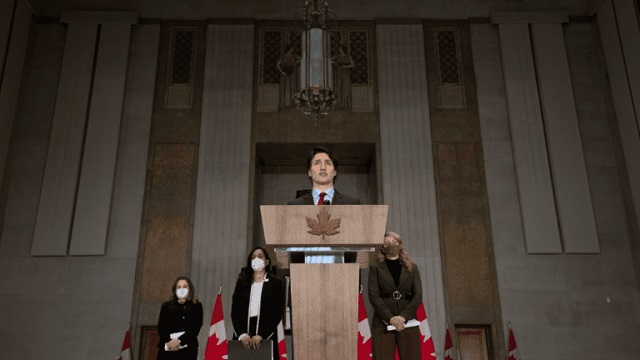The National Citizens Coalition (NCC) is sounding the alarm on a critical week for the Carney government, which, despite enjoying an unearned honeymoon in the polls, has delivered zero results for everyday Canadians. As the G7 summit looms large and the House of Commons prepares to adjourn, this is a make-or-break moment for Prime Minister Mark Carney to prove his government is more than empty promises. Canadians are watching, and the NCC is calling out the glaring failures that threaten a grim summer of economic decline, and continued crime, chaos, and rising unemployment.
Housing Minister Gregor Robertson Caught in $10.85 Million Scandal
Recent revelations from Blacklock’s Reporter expose Housing Minister Gregor Robertson’s attempt to conceal $10.85 million in personal property investments during Commons questioning. This shocking lack of transparency from the minister tasked with addressing Canada’s housing crisis raises serious questions about his integrity and ability to prioritize Canadians struggling with skyrocketing costs. While Robertson dodges accountability, and Carney apparently scoffs at providing housing relief to millions suffering under a Liberal-made crisis, young professionals and young families are wondering if they’ll ever have a chance to own a home bigger than Canada’s much-maligned supply of ‘dog-crate condos.’
The NCC demands a full ethics investigation, the resignation of Gregor Robertson — who, as one of the architects of the Vancouver housing crisis, should have never been handed this file to begin with — and immediate action to restore trust in this critical portfolio.
Pipeline Delays and Provincial Obstruction Threaten Economic Growth
The Carney government’s inaction on pipelines is stalling Canada’s economic potential. Despite promises of “nation-building projects,” British Columbia and Quebec continue to block and veto critical energy infrastructure, with Carney failing to assert federal leadership. His vague talk of “consensus” and “decarbonized” barrels has led to zero progress, leaving Alberta’s economy in limbo and Canadians facing higher energy costs. With no clear plan to advance projects, the government is squandering opportunities to create jobs and secure energy sovereignty. The NCC urges Carney to act decisively this week to break the provincial logjam and deliver results.
Immigration Chaos: Lena Diab’s Unchecked Honour System Fails Canadians
Immigration Minister Lena Diab’s reliance on an ‘honour system’ for millions of temporary visitors with expiring visas is a recipe for disaster. As Canada grapples with unsustainable immigration levels, Diab’s apparent plan for millions of temporary workers and failed ‘diploma mill’ attendees assumes compliance without enforcement, ignoring the high-propensity for fraud, and the ongoing and urgent strain on housing, healthcare, and public services. The Liberals’ Strong Borders Act promises reform, but its loaded with unnecessary overreach and vague measures.
A lack of urgency leaves Canadians vulnerable to further crime, chaos, closed emergency rooms, high rents, and failing infrastructure. With immigration continuing to spiral out of control, the NCC calls for concrete action to drastically lower immigration targets, expedite deportations, and prioritize Canadian citizens and the record amounts of unemployed before the House adjourns.
Canadians Deserve Results, Not More Hollow “Elbows up” or “Team Canada” Rhetoric
This week’s G7 summit in Alberta and the impending House adjournment are the Carney government’s last chance to show leadership, before an undeserved summer break for a government that will be overseeing deepening economic decline, rising crime under a refusal to tackle catch-and-release bail, and growing unemployment. Canadians cannot afford another season of unfulfilled promises and unchecked crises. The NCC demands Carney use the G7 platform to secure trade stability, meaningful energy deals with our allies, and table a federal budget to address the cost-of-living crisis made worse by inflationary Liberal spending. Failure to act now will cement an early legacy of inaction and leave Canadians to endure a prolonged period of hardship.
“The Carney government’s honeymoon has been built on hype, not results,” says NCC Director Alexander Brown. “From Gregor Robertson’s hidden millions, to stalled pipelines, to an immigration system in continued disarray, Canadians — and particularly young Canadians — are being let down. This week is Carney’s chance to prove he can deliver beyond the lies that were told to placate a portion of the electorate at the polls. If he fails to act, the economic decline, the crime and chaos, will only worsen, and everyday Canadians will pay the price.
“True Canadian leaders like Alberta Premier Danielle Smith are in attendance at the G7 along with Carney. If actual acts of ‘nation-building,’ and not more net-zero de-growth, do not come naturally to the PM, he should turn to those who have never wavered in their quest to make life more affordable for the hard-working citizens they are privileged to represent, and who know when to get out of the way to allow Canadians to prosper. More of the same internal, ideological sabotage from the Liberals cannot ruin this dire moment for Canada’s rebirth and recovery.”
The NCC calls on all Canadians to hold the Carney government accountable. Join us in demanding transparency, action, and results before the House adjourns and the G7 summit concludes. Together, we can fight for a stronger, more prosperous Canada.
About the National Citizens Coalition: Founded in 1967, the NCC is a non-profit organization dedicated to advocating for individual freedom, lower taxes, less government waste, and a stronger Canada. We hold governments accountable and fight for the interests of everyday Canadians.
Related


















